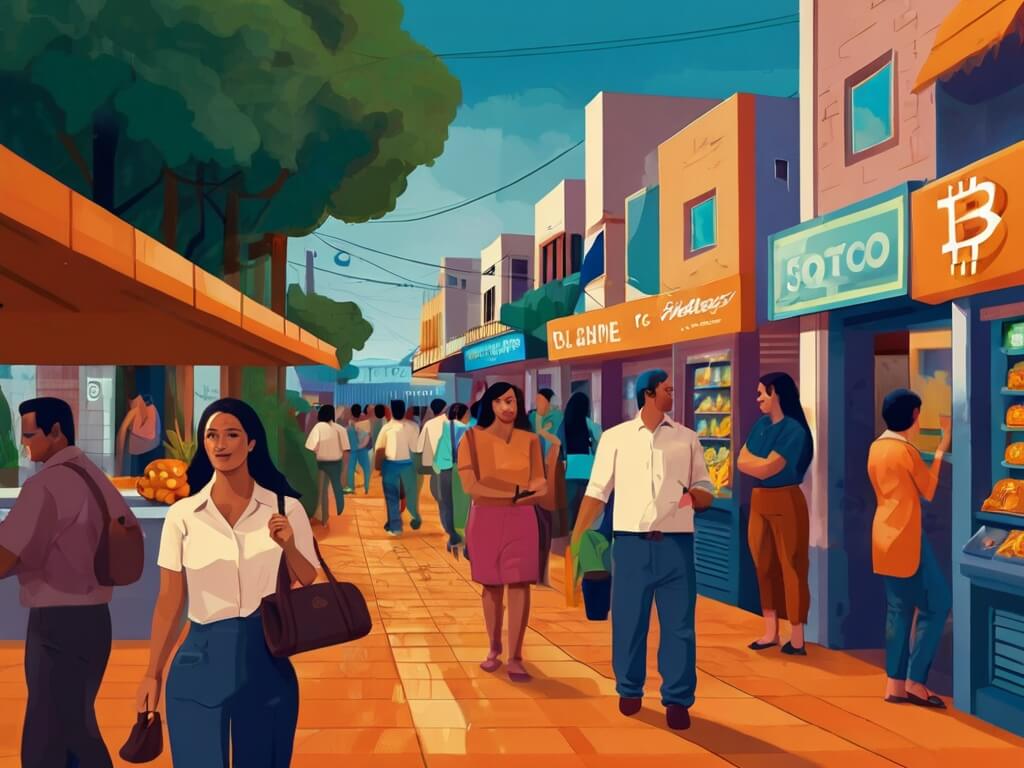Money, the driving force behind the world’s economy, is undergoing a transformation in the digital era. While government-issued fiat currencies have long been the norm in global finance, the ascent of cryptocurrencies, notably Bitcoin, is challenging this established order. A vivid example of this shift is El Salvador’s groundbreaking decision to adopt Bitcoin as legal tender in 2021, setting the stage for an intriguing clash between traditional fiat currencies and decentralized digital alternatives.

El Salvador’s Bold Bitcoin Experiment
El Salvador made headlines by becoming the first country to embrace Bitcoin as legal tender. President Nayib Bukele’s recent re-election victory, securing an overwhelming mandate of 87.7%, signals strong public support for the unconventional move. Despite facing opposition, particularly from the International Monetary Fund (IMF), El Salvador remains committed to its Bitcoinization journey. The question arises: Can Bitcoin truly disrupt traditional fiat currencies on a global scale?
Read more: Bitcoin Volcano Bond Unveiled: El Salvador’s Path to Innovation and Prosperity
IMF’s Concerns and El Salvador’s Defiance
The IMF, expressing apprehensions about Bitcoin’s extreme volatility and lack of transparency, urged El Salvador to reconsider its decision. However, Vice President Felix Ulloa affirmed that Bitcoin would continue as legal tender during Bukele’s second term. This defiance is part of El Salvador’s broader strategy to position itself as a crypto-friendly haven, attracting global digital nomads. Yet, the IMF’s warnings echo concerns about potential risks to financial stability in a country already grappling with economic challenges.
Read more: The Evolution of IMF’s Cryptocurrency Regulation Strategy and Heightened U.S. Vigilance
SEC Approval and Shaping Legitimacy
In January, El Salvador received a significant boost to its Bitcoin adoption efforts with the U.S. Securities and Exchange Commission (SEC) approving the ProShares Bitcoin Strategy ETF. This marked a pivotal moment, indicating a growing acceptance of digital assets in mainstream U.S. finance. Bukele’s government sees this as validation for their commitment to Bitcoinization, challenging the IMF’s reservations. If the world’s largest economy acknowledges Bitcoin’s investment worthiness, El Salvador’s choice gains further credibility.
The Bitcoin Bonds Gambit:
With his renewed mandate, President Bukele is pushing ahead with an audacious plan to issue “Bitcoin Volcano bonds,” linking state debt to Bitcoin’s price. This pioneering move, involving a proposed $1 billion issuance, represents a unique fusion of Bitcoin and traditional government bonds. While risky due to Bitcoin’s volatility, El Salvador aims to attract global investors by capitalizing on its status as a crypto trailblazer.
The Bitcoin City Vision:
Bukele’s administration is not stopping at bonds; they envision a futuristic “Bitcoin City” funded by $1 billion worth of tokens. This ambitious project, functioning as a tax-free crypto haven, relies on geothermal energy from the Conchagua volcano. Critics dismiss it as a publicity stunt, citing infrastructure and investment challenges. Yet, Bukele remains undeterred, emphasizing that progress will happen in phases. The success of Bitcoin City hinges on whether El Salvador can secure the necessary funds from Bitcoin whales and venture capitalists.
El Salvador’s Bitcoin Holdings – Fact or Fiction?
President Bukele often points to his government’s expanding Bitcoin treasury as proof of its potential. Using unofficial portfolio trackers, he claimed a valuation exceeding $90 million in December. However, the lack of transparency around El Salvador’s Bitcoin holdings raises questions about the accuracy of these figures. Bukele’s use of Bitcoin profits for publicity adds another layer of complexity to evaluating the true impact of El Salvador’s crypto experiment.

The Verdict – Can Bitcoin Usurp Traditional Currencies?
As Bukele embarks on another 5-year term, El Salvador stands at the forefront of the clash between fiat currencies and emerging digital alternatives like Bitcoin. While entrenched financial systems resist change, El Salvador’s experiment serves as a test case for the broader potential of cryptocurrencies. The hurdles are substantial, from the dominance of the USD as the world’s reserve currency to the rise of Central Bank Digital Currencies (What is CBDCs?).
For now, traditional currencies maintain their dominance. However, Bukele’s ambitious vision, including Bitcoin bonds and Bitcoin City, could influence the narrative. El Salvador may play a pivotal role in determining whether Bitcoin can evolve from being viewed as a speculative asset to a mainstream global currency. As cryptocurrencies integrate further into various sectors, the global community eagerly watches to see if El Salvador’s experiment sparks a revolution in the world of money.
